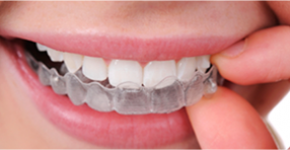
If you frequently wake up with a sore jaw, a dull headache or tooth pain, you may want to ask Dr. Dorian Cucreanu if you are suffering from a condition called bruxism. Bruxism, or teeth grinding, affects about 10 to 15 percent of adults.
What are nightguards?
A nightguard is a device placed in the mouth on top of the teeth to help with grinding and clenching. Grinding implies the moving of the jaw back and forth, while clenching is biting down with pressure for an extended period of time. The guard acts as a protective layer between your top and bottom teeth.
These devices are also called occlusal guards, occlusal splints, or bite splints. Usually, the guard is made of plastic and is placed over some or all of the upper or lower teeth. In most cases, guards cover only your upper teeth. But sometimes, if you wear braces or have another dental appliance, a dentist can make a guard for your lower teeth, as well.
They re-establish your natural space and protect your teeth from grinding or clenching together, which can cause you to chip and crack your teeth and strain your jaw muscles.
Nightguards don’t stop you from clenching or grinding, but they serve as a cushion so that your teeth wear down the guard rather than your teeth. They also give your jaw a rest while you sleep. Plus, they can help you and your sleep partner sleep better, too.
If you are experiencing any symptoms of TMJ, we encourage you to contact our office today to schedule an appointment.
